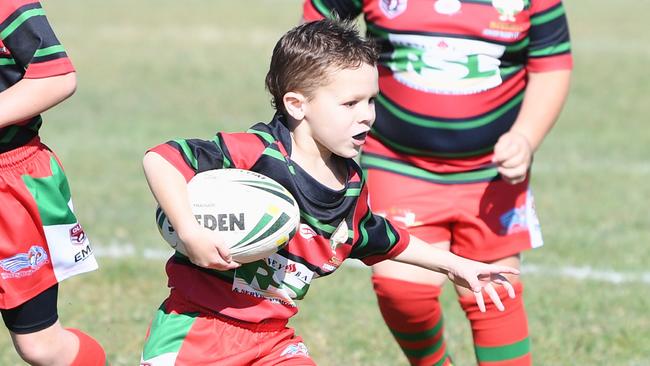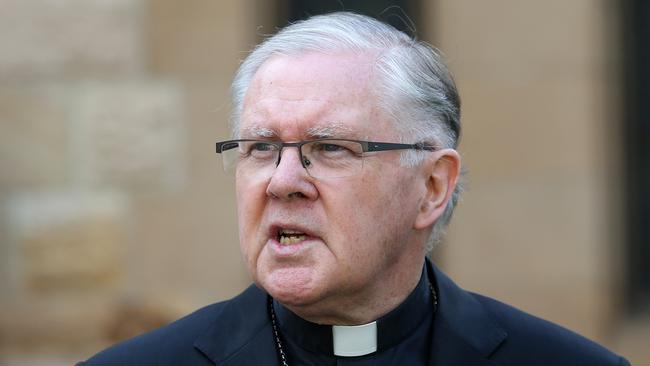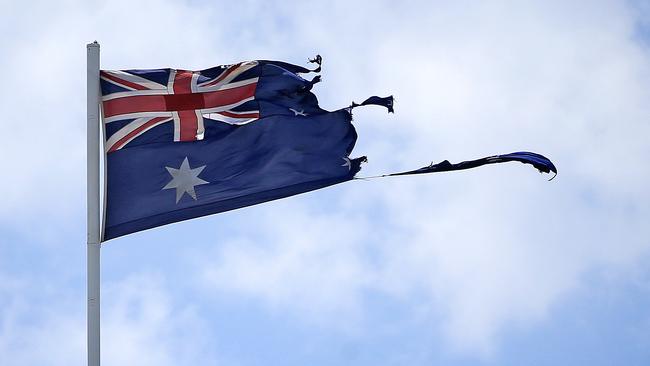Letters: No tackling rule makes rugby league kids too soft
Today readers have their say on the expansion of the no tackling rule in junior rugby league, priests being forced to report confessions of child abusers and changing the date of Australia Day.

Opinion
Don't miss out on the headlines from Opinion. Followed categories will be added to My News.
I AGREE with columnist Mike Colman’s view on Queensland Rugby League’s move to expand its “no tackling” edict to the under-7 ranks ( C-M , Jan 16).
As a father of two boys, one aged six and the other eight, I have seen both sides of the tackling debate.
The non-tackle oztag season my six-year-old played was rubbish.
We weren’t told it would not be non-tackle before we signed him up.
It was confusing for the kids, who will just get thrown in the deep end when they are eight, and will have to tackle much larger kids. That’s when the kids will leave the game.
More support is needed for junior coaches, not stopping the physical element.
Wake up QRL. No one I know wants these new rules, brought in to save rugby league.
Maybe take a leaf out of the AFL’s book and promote our great game at school level.
It’s a physical sport. Delaying tackling will only make our kids soft and not want to play the game.
Michael Pittendreigh, Everton Hills
THANKS to Mike Colman for helping to bring to the fore the increased pampering of our children.
Before 1990, we rarely had to stop a game of tackle footy on the school oval. We only stopped it once the tackling became too rough.
Mostly the players were great at self-governing their own game.
Now we seem to be raising a group of namby pamby pansies.
Toughness has become a lost value in today’s PC society.
Les Morisset, Labrador
THE article addressing the participation of young boys in rugby league highlighted that the number of boys playing the football code is falling.
The main reason is the tackling aspect of the game.
While this involves the physical collision of two or more boys, there is no doubt some pain will be endured.
This can be ameliorated by having only a one-on-one tackle and playing against boys of the same weight as was done in my day.
Rugby league is a healthy pastime for the main part and is therapeutic in many ways. It teaches teamwork, co-operation, courage and enhances physical strength.
The notion of not scoring the games up to a certain level has some merit, but this is mostly driven by political correctness.
There are those who like the idea of winners and losers and there are those who don’t. Life is one huge competition in many ways and getting youngsters to get used to the idea starts at school and sporting competitions, where grades are used to register the level of performance
of a child.
Stephen Kazoullis, Highgate Hill
***********

SEAL OF CONFESSION A RISK TO CHILDREN
BRISBANE Catholic Archbishop Mark Coleridge is failing to protect children, according to the headline “We’ll defy confession law” ( C-M , Jan 16).
To link the proposed law that would force priests to report the confessions of child abusers to “religious freedom” is an attempt to safeguard the power of the Church, which in the eyes of parents and the wider community has protected pedophiles.
No parent has ever given a member of the clergy the right to put their child at risk.
After taking into account all the evidence, the royal commission’s recommendation was for mandatory reporting by clergy.
I thank God for this recommendation which will give children more “freedom” to be safe.
Patricia Hamilton, Twin Waters
IT’S sad that Brisbane’s Catholic archbishop will not support a proposal to (potentially) save children from the horrors of abuse, whether sexual or otherwise.
Has his church allowed its followers a vote on the issue?
The archbishop is putting the so-called seal of confession ahead of the sanctity and safety of children.
We’re painfully aware of the global networks destroying young lives through brutality and sadism.
No one and no church should be permitted to not assist decent people to try to help children.
Peter MacDonald, Woody Point
I THINK Archbishop Mark Coleridge hit the nail on the head when he said the state is effectively saying some sins cannot be forgiven.
Horrific, ongoing sexual abuse of children is considered by most people as the worst of all crimes and cannot be excused or forgiven.
It is laughable that he thinks removing a “very small chance” that a perpetrator will decide to seek help after confessing outweighs the actions of perpetrators who feel they only need to utter a faceless confession in a dark booth to be forgiven and then feel blameless to repeat their sordid behaviour again and again.
Mary McLaren, Wynnum West
THE debate regarding this issue is, for the most part, uninformed.
There is no doubt in my mind that the proposed legislation will be counterproductive.
Why would a child abuser decide to confess to a priest. knowing he will be dubbed in to the authorities?
The solution is simple. The priest can decide to absolve the perpetrator on condition the abuser hands himself over to the police.
There are many instances where the priest will give conditional absolution. While I am no longer a practising Catholic, when I was in short pants, I confessed I had stolen a half-crown from a friend.
The priest told me my absolution would not become effective until I had repaid the money and apologised to the victim. I did, and he subsequently became my best friend.
Priests will never obey this law so why bother discussing it. Find a solution instead.
Stuart James, Mapleton
I AGREE with Archbishop Mark Coleridge and hope he maintains his stance on not breaking the seal of confession.
The advocacy groups and Bravehearts are letting their hearts overrule their heads.
As for the archbishop being slammed as “clearly not victim-oriented”, since when has our justice system been victim-oriented anyway?
Frank Haack, Rockhampton
**********

DATE CHANGE MEANINGLESS
WHILE January 26 might be a day of sadness and dispossession for Aboriginal and Torres Strait Islander people and potentially no longer a day that celebrates our national unity, it’s inspiring to see Jacinta Price (C-M Opinion, Jan 16) advocate for those who belong to the group known as the “quiet Australians” to find practical solutions for the plight of marginalised indigenous Australians.
The emotionally driven idea that changing the day our nation celebrates is somehow going to improve the lives of the most marginalised is somewhat fanciful, rather than finding practical solutions that we can all contribute to as one people.
As such, any calls to move Australia Day, or whether it should be celebrated at all, does not repair the damage of past wrongs to indigenous Australians.
A date change will only ever be a symbolic gesture and the day will continue to be an indelible reminder across generations who see this date as commencing a chain of events that had lasting consequences for many indigenous people.
There is no denying that Australia is a nation with deep indigenous heritage, British foundations and immigrant character.
However, rather than focus on the landing of the First Fleet, we should take the public holiday to reflect and appreciate Australia’s diversity and commitment to multiculturalism as one of this nation’s proudest and most resilient characteristics.
Our national day needs to acknowledge and unite all Australians and focus on recent achievements, celebrating the things about our nation that we’re proud of and grateful for, while not ignoring past wrongs.
Milvio DiBartolomeo, Wellington Point
JACINTA Price observes that the calls to change the date in respect to Australia Day has not been so prominent this year and rightly says that any change will not change the reality for indigenous Australians.
Price suggests the catastrophic bushfire season is the reason.
Another reason may be that we don’t have a better date on which to celebrate our national day.
National days around the world are usually anniversaries of independence or unification.
Our national day is incongruous as it fits neither category, but is rather an anniversary of British settlement, some say invasion.
It is likely that there will be no change of our national day until we become a republic, when we will be able to celebrate the anniversary of that occasion.
So if anybody wants to change the national day, they ought to get behind the campaign to become a republic.
David Muir, chair, Real Republic Australia, Indooroopilly
**********
Join the conversation. Send your letters to couriermail.com.au/letters or email to letters@couriermail.com.au


